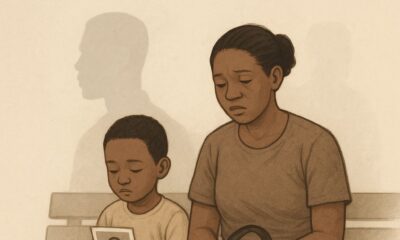Features
‘Fúnmilọ́lá Sanya: Chasing Joy in The Face of Death
There’s this thing about death, it offers you new eyes to life…

I’m here, at this party, Adewale Ayuba’s ‘Ani ijo fuji laririn’ playing in the speakers. I get up to dance. The DJ switches to an Ayefele song. I continue dancing. In my life, it is an unwritten rule not to waste music, especially one that has talking drums whose beats align with the set drum. I’m chasing joy now, and to chase joy is to dance. I shouldn’t be here, but the extroverted side of me has suffered long enough and needs sound for some balance. The bride is also like my sister, and for the sake of sisterhood, I drag myself here.
I’m here to find some rhythm; the week has been so bleak that my mind got foggy. On a certain day during the week, on my way to the Island, I saw a capsized boat very close to the shore. An hour before that, I sensed something was off when I got to the terminal and saw armed police officers and more people than usual there. Bit by bit, I picked up the news and put two and two together: a boat mishap happened the previous day; people were rescued, but some weren’t. Some bodies were recovered, and some are yet to be found. The boat took off from Sandfill, a bit late into the evening.
The week before, another boat had capsised. Three people, including a couple, didn’t make it. “Did the boat leave late too?” I asked a guy who said he narrowly missed the capsised boat, and he said no. The boat left within the right timeframe.
Death has a way of announcing itself. It is in the bowing of heads, hands folded across the chest in defeat, accompanied by heaving signs from quivering lips. Though the sun is blazing hot, the atmosphere is dark and the tension is thick, you can feel it.
My work errand to the Island was quick and easy. Pride and Prejudice was open on my lap. I was stuck on a page because I was listening to conversations around me. “They didn’t wear their life jackets properly,” “The captain been dey speed; dem no dey hear word when person tell them to slow down,” “The waves were too much, the water level was high,” “It happened at Ebute-Ipakodo terminal last week too, a female corper was among those who drowned, and people are still missing,” “The boat left late, people are always in a hurry.” “I dey tell you, no be the time wey the boat comot, na the captain,” “Well, nothing go happen to us, God dey.”
En route to Ibeshe, a group of five or six lively guys talked loudly in the boat. One asked for an opening prayer, another mimicked the prayer scene by Tobi Makinde in Funke Akindele’s “A Tribe Called Judah.” One asked his other, “Play Asake’s Sunshine or Lonely At The Top.” The other said his Bluetooth speaker was down. Over low music, but still loud enough to sing along, they gisted and told the captain to face front and drive slowly.
The atmosphere was a mix of heat and cool from the breeze on the waterway. I felt somehow. I just wanted to go home, pour water on my head and have a cold long bath.
We got to Ibeshe and while off-boarding, the chatter from the boat faded into silence. Everyone was removing their life jackets. The excitement from the guys was gone. Death was here, I could feel it. I saw it when a body was wrapped and rolled into a waiting ambulance. There were people – some seated, some walking behind the body, some standing and facing the wall, their hands sprawled across it, wailing. The body was one of the two missing earlier in the day when I left. It was stuck in the capsized boat.
“If he had been able to find a way out of the boat, he would have made it,” An official of the waterway authority said to a group of people huddled around him. I stood a bit afar, looking at the wrapped body. His shoes were still on his feet – brown and well-laced. His legs extended past the end of the stretcher he was laid on. He must have been tall. Nearby, his life jacket and work bag were on the floor. People tried to take photos and videos but a lady shouted, “No cameras!”
A familiar face joined me; a hairdresser who once loc’d my hair. “My customer is expecting me, but I can’t go to VI today, not with all of these,” She said with a teary face. “Look at this car, the owner is yet to be found. His wife was here earlier asking for her husband.” We moved closer to the group, the official was telling people what to do when a boat mishap happens, “Don’t panic. Trust in your life jacket; it will keep you afloat until rescue arrives. There were successful rescues yesterday.” I asked the official about the captain who I heard was speeding. “Oh, he has been arrested, he’s currently in detention.” Someone tapped me and whispered, “It’s a lie, I hear him swim go another place, dem no catch am.”
“We just identified his body now,” a lady showed me the text she received from the terminal. It is how death dares to offer one a new name. A person now becomes a ‘mere body.’ The audacity of it.
On our way back, inside the keke, our faces were drawn in sadness. The hairdresser quietly said, “It is akosile.” Akosile how? I asked. Who inscribed it? Who was there at his creation, looked at him at the beginning of his life, and had it written that on the 26th of February, in the year 2024, when returning from work to his home and family, he would find himself trapped in a capsized boat and the unforgiving waters would wring life out of him? The angels? The elders? Was it God?
“My sister, it is not like that,” she said. “When death is ready, it can meet the person anywhere. Even if the person is in Jalingo or their house, it will find a way to lure the person to a meeting place, beyond their control.”
Then death must be a coward, I think to myself. How could it choose a nearing 40-year-old man, caught unawares and unprepared? Why doesn’t it seek out those who are ready for it?
If the captain was not speeding, would death come? Suppose the Government does right by the people who commute this waterway, providing safer and bigger boats, good life jackets, ensuring boats have enough fuel before take-off, having first responders trained in first aid, and ensuring the captains are licensed to drive boats, would death still hold its sway?
I walked past the security men. They asked if I’m okay. I told them I had a headache. “It’s the heat,” they said, pointing to the scorching sun. I moved slowly with my heavy feet. My head was banging. I was thinking of the body, his family, wife, children. How the coming days would be so bleak and dark for them. I was thinking of how death doesn’t pause the world, not even for a second, to give room for grief.
The rest of the week is somehow. I feel somehow. I hear the wails and see hands spread across the wall. The nights are long with jerks and headaches that awaken me. My body feels heavy with pain. It scored this pain, carried it, and moved slowly by its weight. The days are slow and I desperately hope for the week to come to an end.
There’s this thing about death, it offers you new eyes to life. Suddenly you’re looking up to the morning sun, soaking more of its shine and watching fiery hues of orange and red move in your closed eyes. You’re taking enough time to dance, not letting the music waste. You’re responding to messages quickly, spending more time with friends on the other side of the phone, unwilling to end calls. This is you redeeming the time. You know that thing Officer Nolan likes to do, looking for meaning in tragedies, that his training officer doesn’t like it, I’m not too fond of it too. So this is not about the sober reflection death brings. It’s about chasing joy.
And so at this party, I dance. I dance because I need movement for the days to come.
***
Feature Image by Vinicius Altava for Pexels





















